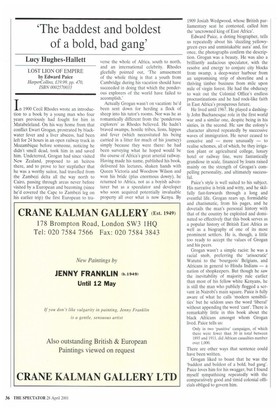'The baddest and boldest of a bold, bad gang'
Lucy Hughes-Hallett
LOST LION OF MPIRE by Edward Paice HatperCollins, £19.99, pp. 470,
ISBN 0002570033
In 1900 Cecil Rhodes wrote an introduction to a book by a young man who four years previously had fought for him in Matabeleland. On his way home from that conflict Ewart Grogan, prostrated by blackwater fever and a liver abscess, had been left for 24 hours in an open railway truck in Mozambique before someone, noticing he didn't smell dead, took him in and saved him. Undeterred, Grogan had since visited New Zealand, proposed to an heiress there, and to prove to her stepfather that he was a worthy suitor, had travelled from the Zambezi delta all the way north to Cairo, passing through areas never before visited by a European and becoming (since he'd covered the Cape to Zambezi leg on his earlier trip) the first European to tra
verse the whole of Africa, south to north, and an international celebrity. Rhodes gleefully pointed out, 'The amusement of the whole thing is that a youth from Cambridge during his vacation should have succeeded in doing that which the ponderous explorers of the world have failed to accomplish.'
Actually Grogan wasn't on vacation: he'd been sent down for herding a flock of sheep into his tutor's rooms. Nor was he as romantically different from the 'ponderous explorers' as Rhodes believed. He hadn't braved swamps, hostile tribes, lions, hippos and fever (which necessitated his being carried in a litter for much of his journey) simply because they were there: he had been surveying what he hoped would be the course of Africa's great arterial railway. Having made his name, published his book, delivered his lectures, shaken hands with Queen Victoria and Woodrow Wilson and won his bride (plus enormous dowry), he returned to Africa, not as a boyish adventurer but as a speculator and developer who soon acquired potentially invaluable property all over what is now Kenya. By 1909 Josiah Wedgwood, whose British parliamentary seat he contested, called him the 'uncrowned king of East Africa'.
Edward Paice, a doting biographer, tells us repeatedly about his 'dazzling yellowygreen eyes and unmistakable aura' and, for once, the photographs confirm the description. Grogan was a beauty. He was also a brilliantly audacious speculator, with the resolve and energy to conjure city blocks from swamp, a deep-water harbour from an unpromising strip of shoreline and a thriving timber business from mile upon mile of virgin forest. He had the obduracy to wait out the Colonial Office's endless procrastinations and he had rock-like faith in East Africa's prosperous future.
He lived until 1967. He played a dashingly John Buchanesque role in the first world war and a similar one, despite being in his sixties, in the second. He saw the colony's character altered repeatedly by successive waves of immigration. He never ceased to conceive and — more unusually — to realise schemes, all of which, be they irrigation plant or agricultural college, luxury hotel or railway line, were fantastically grandiose in scale, financed by loans raised mainly on the strength of Grogan's compelling personality, and ultimately successful.
Paice's style is well suited to his subject. His narrative is brisk and witty, and he skilfully fast-forwards through a long and eventful life. Grogan rears up, formidable and charismatic, from his pages, and he dovetails the man's personal history with that of the country he exploited and dominated so effectively that this book serves as a popular history of British East Africa as well as a biography of one of its most prominent settlers. He is, though, a little too ready to accept the values of Grogan and his peers.
Grogan wasn't a simple racist: he was a racial snob, preferring the `arisocratic' Watutsi to the 'bourgeois' Belgians, and Africans in general to Hindu Indians — a nation of shopkeepers. But though he saw the inevitability of majority rule earlier than most of his fellow white Kenyans, he is still the man who publicly flogged a servant in Nairobi's main square. Paice is fully aware of what he calls 'modern sensibilities' but he seldom uses the word 'liberal' without appending the word 'cant'. There is remarkably little in this book about the black Africans amongst whom Grogan lived. Paice tells us:


































































 Previous page
Previous page